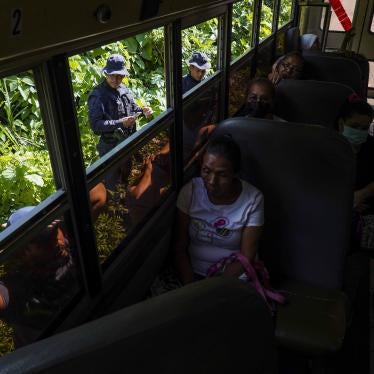I have long known that torture can impair the memory of survivors. What I learned from observing the recent military commission proceedings in the case of Omar Khadr, the Canadian facing trial at Guantanamo for crimes he allegedly committed at age 15, is that it can impair the memory of perpetrators too.
Consider the testimony of Interrogator 1, who appeared at Khadr's military commission hearings earlier this month. Interrogator 1 was Khadr's lead military interrogator at Bagram airbase in Afghanistan, where Khadr was detained for three months after he was captured in July 2002. He began interrogating Khadr less than 12 hours after the teenager's discharge from a hospital, when Khadr was still sedated and on a stretcher.
Skinny and blond with a tattoo on his forearm, Interrogator 1 was one of several interrogators and guards courtmartialed after the death of two Afghans at Bagram. He copped a plea bargain in late 2005, admitting to three incidents of detainee abuse in exchange for a 5 1/2 month sentence. Khadr's prosecutors requested clemency for Interrogator 1 in the expectation that he would help the prosecution convict Khadr. Interrogator 1 also received immunity from further prosecution in exchange for speaking to Khadr's prosecutors.
When questioned last week by Khadr's defence lawyers, however, Interrogator 1 could not recall what Khadr's prosecutors had done on his behalf. He did remember that he and other interrogators had threatened Khadr by telling him a story about the rape and murder of a fictitious young Afghan by "four big black guys" in a U.S. prison.
But Interrogator 1 couldn't recall if he had ever shone a bright light into Khadr's eyes. He couldn't remember forcing Khadr upright on his stretcher in order to cause him excruciating pain. He couldn't recall setting barking dogs on Khadr while the teenager was hooded. He didn't recall making Khadr stand for hours to inflict both physical pain and sleep deprivation, though he did acknowledge that sleep deprivation was a technique used at Bagram, and he had said under oath at his court martial that it was "the practice" to do it to new detainees.
Interrogator 1 didn't deny using these or many other "non-traditional interrogation techniques" (the prosecution's euphemism for torture and cruel, inhuman or degrading treatment), he just couldn't recall one way or the other.
Khadr's interrogations happened eight years ago. It may well have been difficult for Interrogator 1 to recall specific details of what he did in the course of his "six-hour-a-day, seven-day-a-week" interrogations of Khadr.
In fairness to Interrogator 1, if someone asked me whether, between August and October 2002, I sat on the subway next to a skinny blond man with a tattoo on his forearm, I would say that I don't recall. I certainly rode the subway then, but it was almost eight years ago, and I have sat next to so many people that I just can't recall sitting next to a skinny blond man with a tattooed forearm.
On the other hand, if someone asked me if I jumped off a bridge between August and October 2002, I would say no. I may not remember what I was doing every minute of every day of those three months, but I know I did not jump off a bridge because I have never jumped off a bridge in my life.
So why is it that Interrogator 1 can't recall whether he tortured Omar Khadr?
Unless the Prime Minister acts to request repatriation, Khadr faces conviction by a jury of U.S. military officers based on evidence extracted by torture. We may try erase our memory of Canada's role, just as Interrogator 1 claims no recollection of his actions, but history will not forget. By choosing not to intervene, Canada will be judged by history, and it will be judged harshly.






